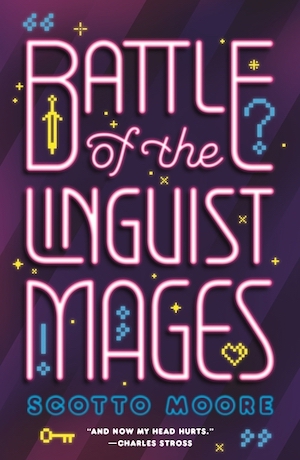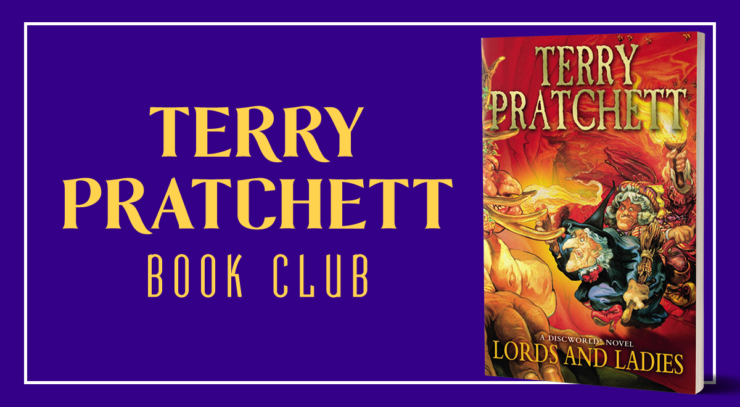Nothing like arriving back just in time to find out you’re getting married? Careful to keep away from the Dancers—we don’t want to attract any Lords and Ladies.
Summary
Granny Weatherwax encounters a woman inside a circle of iron stone in her youth; in present day, that same woman and her cohort plan to take over Lancre. Jason Ogg shoes Binky for Death, keeping a blindfold on, part of an ancient bargain. A crop circle appears. The witches arrive home after eight months away (in Genua and traveling). When Magrat arrives to see King Verence, he tells her all about his plans to make the kingdom better—and also that they’re getting married and that all the arrangements have been made. (Kings don’t have to ask people to marry them, they just do it, he’s been reading about it.) One of his new bean crops lays down in a circle. The coven meets and Granny and Nanny start talking about going up against some folk and “the Dancers,” but Magrat doesn’t know what they are. Granny refuses to tell her and she gets angry, tells them about her engagement and stomps off. She dumps her witching gear into the river. A fellow named William Scrope dies hunting a very special stag, and Granny and Nanny come across his body next to the Dancers (an iron stone circle).
Over at the Unseen University, Ridcully awakens for the day and knows something is amiss, though the Bursar seems to think he’s just aggravated over his new bald spot. Granny and Nanny check over the body and find Scrope was stabbed, and also that someone has inadvisably been dancing around the stones. Someone informs Ridcully of their invitation to Verence and Magrat’s wedding, and Ridcully’s fondness of the area (due to summers spent there in youth) has him organizing a group to go: himself, the Bursar, the Librarian, and young Ponder Stibbons. The wizards are also noticing more crop circles than usual, including one in oatmeal. Magrat wakes in a palace, no longer a witch, and now has a servant (Millie Chillum, who she’s known forever) and a lot of complicated new clothing to figure out how to wear. Granny goes to check on bees, the only mind she could never learn how to Borrow; they seem worried.
Buy the Book


Battle of the Linguist Mages
Nanny goes to visit her son’s forge, tells the men in town to look after Scrope’s widow, and asks Jason what’s new since they left. He finally admits that there’s a new coven about: Diamanda and Perdita and “that girl with the red hair from over in Bad Ass and them others.” Diamanda (who used to be Lucy Tockley until she changed it to sound more appropriately witchy) is leading the group and insists that they can teach themselves to be witches—they’re the ones who’ve been dancing around the stones. Nanny tries to explain to Jason that the people they’re courting by doing all that dancing are the “Lords and Ladies,” who are essentially the Fair Folk. She heads over to Granny’s to find her Borrowing and puts on a kettle to wait for her return. Granny wakes and they talk of what they’ve discovered: the new coven dancing all the time and thinning of the walls and the fact that something came into their world from another realm and killed Scrope. (It turns out to be a unicorn.) Granny can sense an Elf presence.
Perdita (who used to be Agnes Nitt) is learning about witchcraft from Diamanda, who she is very impressed by, only she’s not sure if what they’re doing is all that sound. Granny and Nanny crash their coven meeting, and Granny and Diamanda exchange some extremely heated words that lead Nanny to bite through the brim of her hat. They agree to meet at noon to show each other their skills—basically a duel but with witching. They leave and Granny and Nanny talk about how Agnes does have some real witching talent in her, but Diamanda was given that power by something else. Granny tells Nanny that she knows she shouldn’t have lost her temper and that she lets things get the best of her and now she has to fight this girl. Internally, Granny has a sense that she’s about to die, and she confronts the unicorn on her lawn and tells it to go back where it came from. She arrives in the middle of the town at noon for her face-off with Diamanda, which the other decides will be a staring contest. Only it won’t be the kind of staring contest Nanny and Granny are expecting…
Commentary
We’re back with our favorite coven, though they promptly break up, like every band that ever broke your heart.
The flashback with young Granny at the start of the book is great, though, particularly in seeing the ways in which Esme Weatherwax has changed… and the ways that she hasn’t. And, of course, Jason’s occasional employment by Death, and what you’re meant to do with the melted down iron from Binky’s shoes. The idea that iron shoed to Death’s horse would give you certain protection or power (provided you didn’t wear it) is properly magical, and also a great way of seeding a “Chekhov’s gun” of sorts right into the narrative.
Pratchett really keeps going with the Shakespeare references in this book, which aligns it more closely with Wyrd Sisters. (There are a couple in Witches Abroad, I believe, but not the sheer volume you see here.) Is it the environment that makes him want to dust those little winks through the text? Lancre is a Shakespearean kingdom, full stop? Or maybe he just had a bunch he meant to use in Wyrd Sisters, and saved them up when they couldn’t be added?
Fans of Discworld love to talk about the ways in which Pratchett used the various Wiccan and occult sects—essentially the “types” within witchcraft circles—in the creation of his witches, and now he’s adding to it with the new coven. This is the first time we’ve gotten the sort of thing I remember from my childhood: the “witch phase,” which is a given to many girls and afab folks in youth provided that those sorts of activities aren’t forbidden in a given household. Basically, the conceit is that most kids who are raised female will eventually go through a period where they get super into witchcraft and magic with their pals. It’s often thought of as a manner in which young women try to assert their combined power in a world that won’t allow them any.
The ‘90s had a bit of an upswing in acknowledging that, which is also how we got movies like The Craft and Hocus Pocus. Diamanda’s group is definitely that sort, even if her personal power is coming from a more nefarious avenue, with their interest in things like Ouija and tarot cards and wearing all that black lace to be dramatic. It’s extremely familiar for kids of a certain generation—I remember having my own tarot deck and a bag with rocks that had runes etched into them? An assortment of crystals and candles and that sort of thing (it helped that my mom was also big into all that stuff, so she encouraged it), too. I never wore black lace, but that’s because I was more of an Agnes i.e. in awe of the girls who could wear the black lace. I loved the goth and witchy aesthetic, but I never felt that I personally could pull it off.
But obviously, we’re meant to be wary of these girls because they’re not sure of what they’re doing… and one of them in particular is bad news. Isn’t that usually the way of things? It’s all fun and games until the leader of your occult meetings turns out to be in league with some real bad ye olde god? Or demon? Or, in this case, Elf?
Asides and little thoughts:
- Look, not to get people all angry about the Pratchett vs transphobia dust up again, but there’s that quote about Jason that says “Nanny Ogg had had an adventurous youth and wasn’t very good at counting, but she was pretty certain he was her son.” And obviously the joke here is that Nanny has had so many kids that she can’t properly remember which ones exited her body and which she maybe sort of accidentally adopted. But the other way you could take that quote is that Nanny Ogg is a trans woman, hence not being entirely sure which kids are hers. Is all I’m saying.
- I’ve said it before and I’ll say it every book, Nanny’s asides (“Bugger, I’ve bitten right through the brim. Right through.”) are… she is perfect and I adore her, even if she is a terror to her poor daughter-in-laws.
- I do love how Pratchett looked up those actual witches names from historical record, nabbed the ones he likes best, and just kept reusing them with slight variations. (This being how Agnes Nitt is similar to Agnes Nutter and Amanita DeVice is close to Anathema Device.)
Pratchettisms:
There was a badger in the privy.
Nanny Ogg never did any housework herself, but she was the cause of housework in other people.
His subjects regarded him with the sort of good-natured contempt that is the fate of all those who work quietly and conscientiously for the public good.
Using metaphor in front of a man as unimaginative as Ridcully was like a red rag to a bu—was like putting something very annoying in front of someone who was annoyed by it.
People were always telling him to make something of his life, and that’s what he wanted to do. He wanted to make a bed of it.
Then it was moonlight. Now it was day.
“I like your black lace hanky,” said Nanny, not a bit abashed. “Very good for not showing the bogies.”
Next week we’ll read up to “So she never noticed the hollow near the stones, where eight men slept. And dreamed…”










